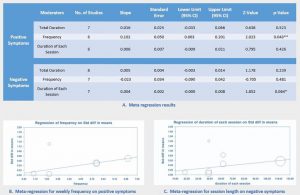Spirituality is Associated with Improved Psychological Well-Being in Patients with Persistent Mental Illness
By John M. de Castro, Ph.D.
“No cure that fails to engage our spirit can make us well.” – Victor Frankl
Religion and spirituality have been promulgated as solutions to the challenges of life both in a transcendent sense and in a practical sense. What evidence is there that these claims are in fact true? The transcendent claims are untestable with the scientific method. But the practical claims are amenable to scientific analysis. There have been a number of studies of the influence of religiosity and spirituality on the physical and psychological well-being of practitioners mostly showing positive benefits, with spirituality encouraging personal growth and mental health. But there is still a need to investigate the relationships of spirituality with psychological well-being in patients with persistent mental illness.
In today’s Research News article “Spirituality and Employment in Recovery from Severe and Persistent Mental Illness and Psychological Well-Being.” (See summary below or view the full text of the study at: https://www.ncbi.nlm.nih.gov/pmc/articles/PMC7827133/ ) Saiz and colleagues recruited adult patients with persistent mental illness who were in a program to prepare them for employment. The disorders included psychoses, schizophrenia, personality disorders, and mood disorders. The patients completed questionnaires measuring stage of recovery, hope, self-determination, psychological well-being, including self-acceptance, positive relationships, autonomy, environmental mastery, personal growth and purpose in life subscales, employment, work motivation including of satisfaction, integration into the work environment, social acceptance, social performance, job skills, self-esteem, perception of family support and job assertiveness subscales, spiritual experiences and spiritual well-being.
They report that the higher the levels of spirituality and work motivation, the higher the levels of psychological well-being and recovery. When spirituality and work motivation were used together as predictors of recovery only spirituality was significantly related. Similarly, when spirituality and work motivation were used together as predictors of psychological well-being only spirituality was significantly related. Hence, when work motivation is considered, only spirituality is significantly related to psychological well-being and recovery.
These findings for patients with persistent mental illness make sense as spirituality has been found in the past with other groups to be associated with psychological well-being and better mental health. The findings, though, are correlational and as such causation cannot be determined. Only that spirituality is associated with to psychological well-being and recovery can be ascertained. But this association is potentially important and suggests that the promotion of spirituality may be beneficial for patients with persistent mental illness, helping them recover better and be psychologically healthier. This remains for future research.
So, spirituality is associated with improved psychological well-being in patients with persistent mental illness.
“many people with mental illness desire the incorporation of spirituality in their recovery process/treatment.” – Jan-Stella Metheany
CMCS – Center for Mindfulness and Contemplative Studies
This and other Contemplative Studies posts are aalso available on Google+ https://plus.google.com/106784388191201299496/posts and on Twitter @MindfulResearch
Study Summary
Saiz, J., Galilea, M., Molina, A. J., Salazar, M., Barsotti, T. J., Chopra, D., & Mills, P. J. (2021). Spirituality and Employment in Recovery from Severe and Persistent Mental Illness and Psychological Well-Being. Healthcare (Basel, Switzerland), 9(1), 57. https://doi.org/10.3390/healthcare9010057
Abstract
People diagnosed with severe and persistent mental illness (SPMI) face multiple vulnerabilities, including when seeking employment. Among SPMI patients, studies show that a stronger sense of spirituality can help to reduce psychotic symptoms, increase social integration, reduce the risk of suicide attempts and promote adherence to psychiatric treatment. This study examined how the variables spirituality and employment affect the recovery process and psychological well-being of people with SPMI who attend employment recovery services. The sample consisted of 64 women and men diagnosed with an SPMI. The assessment instruments included the Recovery Assessment Scale, Ryff Psychological Well-Being Scale, Work Motivation Questionnaire, Daily Spiritual Experience Scale, and Functional Assessment of Chronic Illness Therapy—Spiritual Well-Being (FACIT-Sp12). Hierarchical regression analyses were performed to compare three different models for each dependent variable (recovery and psychological well-being). The findings showed that job skills predicted psychological well-being and recovery. When spiritual variables were included in the model, job skills dropped out and the dimension meaning/peace of the FACIT-Sp12 emerged as the only significant predictor variable. Integrating spirituality into recovery programs for people with SPMI may be a helpful complement to facilitate the recovery process and improve psychological well-being.
https://www.ncbi.nlm.nih.gov/pmc/articles/PMC7827133/









